Advice for Yellow Belts from Advanced Students
We asked some of our more advanced students & instructors what they do a month or two beforehand in order to prepare for their next rank test. Here’s what they had to say . . .
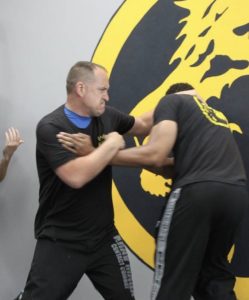 “The personal training I took before the test helped a lot!! I practice moves, stance, footwork while I’d be in my kitchen doing chores or at work when I would take breaks. It’s alway on my brain any way, but weeks leading up to a test, that’s all I can think about!!”
“The personal training I took before the test helped a lot!! I practice moves, stance, footwork while I’d be in my kitchen doing chores or at work when I would take breaks. It’s alway on my brain any way, but weeks leading up to a test, that’s all I can think about!!”
–Nathan Crews
“Before both of my tests, I got together with my partner or a group of people and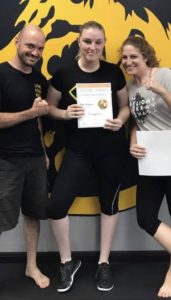 worked through the curriculum. Just to make sure I knew all of the technique sand had someone to work with. I also try to work on my breathing leading up to the test so that I remember to breathe but also it helps with my nerves. I [also] use combos or techniques that I’m working on as my mantra to help me go to sleep. It sounds weird but if you repeat them in your mind, it kind of clears your head and helps you sleep. Or that’s what I have found. Also I practice defenses in the mirror when I get ready in the morning. So… Krav has taken over my life.” – Kara McManus
worked through the curriculum. Just to make sure I knew all of the technique sand had someone to work with. I also try to work on my breathing leading up to the test so that I remember to breathe but also it helps with my nerves. I [also] use combos or techniques that I’m working on as my mantra to help me go to sleep. It sounds weird but if you repeat them in your mind, it kind of clears your head and helps you sleep. Or that’s what I have found. Also I practice defenses in the mirror when I get ready in the morning. So… Krav has taken over my life.” – Kara McManus
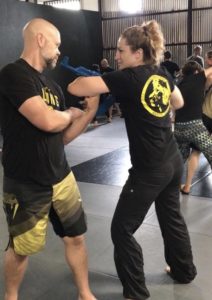 In later tests, I did a lot of visualization ahead of time. I went through the curriculum sheets and made sure I could visualize step by step what I was supposed to do. If there was a technique that I felt like I knew, but couldn’t elucidate every single step, then I would do it dry nice and slow until I could figure out exactly what step went where.
In later tests, I did a lot of visualization ahead of time. I went through the curriculum sheets and made sure I could visualize step by step what I was supposed to do. If there was a technique that I felt like I knew, but couldn’t elucidate every single step, then I would do it dry nice and slow until I could figure out exactly what step went where.In the last test I took, I prepared by taking practicing A LOT with my partner in advance. We filmed ourselves and watched it in slow motion in order to pick apart our technique and improve (it’s a painful process, but it is truly invaluable). We also sent the videos to the instructor grading the test (Alan Predolin out in LA) so that he could pick our technique apart as well. I worked hard on fixing what was wrong.
Another thing that has helped me a lot in my training is a training notebook. I would take notes after class and refer back to them when I was studying at home. It’s proven that the sheer act of writing things down helps your memory even if you never look at the notes ever again. I highly recommend it.” – Katie Fryer
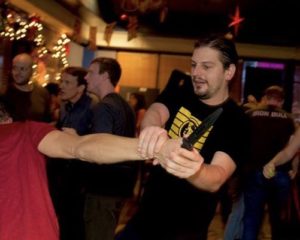
When you’re working moderate, make sure you feel every. single. checkpoint. and that all the body mechanics are working exactly as intended. Make contact and mark targets. Throw combatives that absolutely make sense.
But most importantly, even when working more moderately, never do so while stripping the intention of what you’re doing. You can still work at this pace, think about what you’re doing, and think about aggression/intent. Working moderately does NOT mean working lazily. In fact, if you’re really applying your mind to this, it should be just as if not more exhausting. Train your body to do everything at 100%, no matter the speed. That way when stress comes on or unexpected things come at you, you’re dropping from 100% to 50%, rather than 50% to 0%.
For me the biggest piece of getting a technique down is body AND brain — understanding why each piece is there, then mentally checking it as your body learns to feel when it’s right and when it’s wrong. Take notes after class and take mental notes while working at different speeds. If something feels off, it probably is. Figure it out.
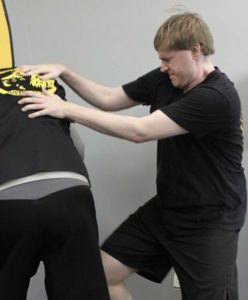 class. Prepare your body for that grind, because it will be a grind. Find out where you limit is and start to push on it. I know nobody likes cardio (I sure don’t), but it’s going to be stamina that carries you through a test.
class. Prepare your body for that grind, because it will be a grind. Find out where you limit is and start to push on it. I know nobody likes cardio (I sure don’t), but it’s going to be stamina that carries you through a test.Go over the curriculum in your head. If you can’t visualize the steps of a technique, ask about it. Chances are, in the weeks leading up to a test, you’ll be hearing a lot of ‘Are there any questions?’ or ‘Are there any techniques you want to go over?’ Take advantage of that. If you have a question about something, chances are someone else does too, so it’s not like you’re interrupting the class or anything. Everyone benefits from each question that’s asked.” – Greg Fisher
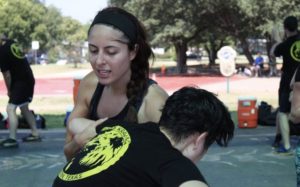
“Here are 3 of my simple things…
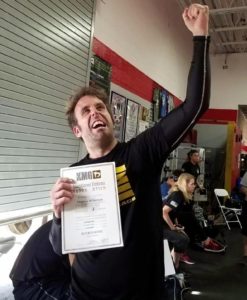 1. Keep and maintain a training journal. Sometimes the simple things like footwork can be integrated into everyday life.
1. Keep and maintain a training journal. Sometimes the simple things like footwork can be integrated into everyday life.
2. Ask relevant questions. If you’re thinking it, someone else probably is too.
3. Maximize efficiency with your time in the gym. For example, NEVER have lazy footwork when holding for your partner.
Hope this helps!” – Thomas Wilkerson
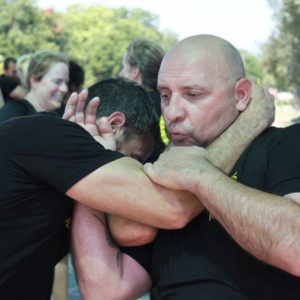 mechanics of the technique. Slow is smooth and smooth is fast. By the end of each class leading up to testing day it should be a mini-test for yourself.
mechanics of the technique. Slow is smooth and smooth is fast. By the end of each class leading up to testing day it should be a mini-test for yourself.When I go to class I set my goal beyond passing a test. The ultimate goal is being able to defend yourself during a potential life or death confrontation. My training mindset is to learn how to adapt. When I feel a little pain, I learn how to perform the technique despite it. When I’m having an off day mentally or physically, I work harder to overcome the uncomfortable feelings. I do this while maintaining the fundamentals.
So……. No matter what…………………….FUNDAMENTALS!” – Javier Bustos
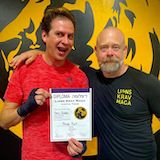 1. Those instructor corrections are important. I remind myself of these corrections every time I’m in class and even work on some outside of class
1. Those instructor corrections are important. I remind myself of these corrections every time I’m in class and even work on some outside of class2. The Conditioning class is great for building stamina but it’s also the prefect place to work on the basics. I always work on my punches, range, keeping my hands up, etc. no matter what we are doing in that Conditioning class.
3. FINISHING MODE. Train it! I see so many lower levelers do great moves and then half-hearted finishing.
4. EAT RIGHT. You can’t train well without proper protein, carbs, fats. Dial down the sugar, processed foods and alcohol and you’ll have more energy.” – Chris Roldan
Watch your partners do the technique in normal classes and note (to yourself, unless asked) the little things they’re doing that contribute to failure or success in the situations you’re training for. (i.e. What caused my partner
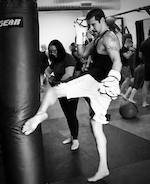 to successfully defend that type of knife attack while taking the least amount of damage? If I had attacked slightly differently, would they still have had that success?) Cross reference what the instructors say about these techniques, and make a plan for your next few reps. What is it you need to improve on? What is it that you’re already really good at? Give yourself credit for being good at things. This will help you focus on what you should work on improving.
to successfully defend that type of knife attack while taking the least amount of damage? If I had attacked slightly differently, would they still have had that success?) Cross reference what the instructors say about these techniques, and make a plan for your next few reps. What is it you need to improve on? What is it that you’re already really good at? Give yourself credit for being good at things. This will help you focus on what you should work on improving.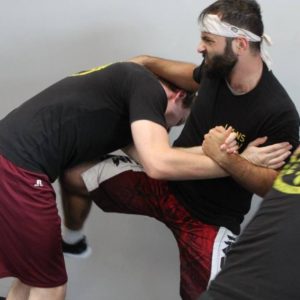 “I found that doing multiple classes in a row when you train, and getting used to pushing through that long stretch will make the push through the test easier. Not easy.
“I found that doing multiple classes in a row when you train, and getting used to pushing through that long stretch will make the push through the test easier. Not easy.Practice with your test partner drilling through the curriculum – it’s a test so use the curriculum as a study guide.
I’ve always done a private session with one of the instructors to do a curriculum run through so I know what needs work. If I was testing in October I might do one in September to identify problem areas and then another a week before the test to cement the things you’ve improved and what still needs tweaking. Splitting the private between to or four people makes it pretty cheap. Also, I agree with everyone that said do the work in class, get the reps in!”
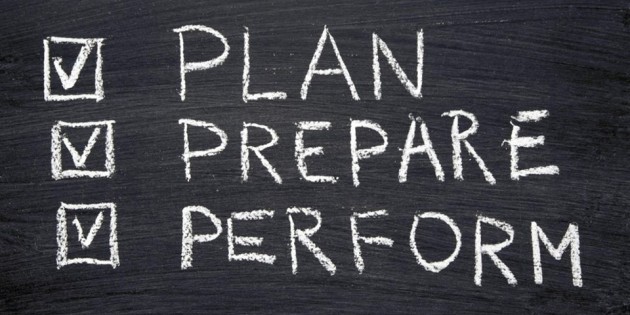
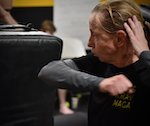
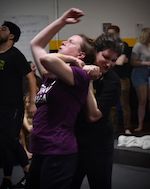
Comments are closed.